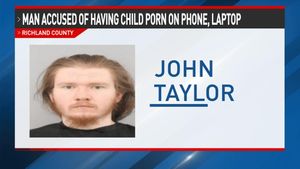Howard County officials are stepping up their efforts to assist federal government employees who are grappling with job insecurity as recent policy changes have left many workers feeling uncertain about their employment status. An open house was held Wednesday night at the Howard County Workforce Development Center, which is now becoming the hub for support services aimed at federal workers—those who have been fired, furloughed, or are fearing such actions might soon impact them.
According to estimates, approximately 50,000 federal workers reside within Howard County. Following the uncertainties surrounding job security, more than 400 of these individuals participated in a recent forum hosted by Howard County Executive Calvin Ball. During this forum, many expressed significant anxiety over their current situations with some fearing they might have already been let go, or could be soon. "I think the No. 1 concern is, frankly, the lack of clarity and the fear of uncertainty," Ball stated, adding, "How are they going to handle their health care? How are they going to handle their benefits? What are the details moving forward? And, I think so many people have so many questions..."
Federal workers have also expressed apprehension about potential retaliation as they are subject to return-to-office mandates amid juggling child care and transportation challenges. Ball pointed out stories of households with dual federal workers or contractors facing unique stressors: "We're hearing not only from households... but we're also hearing from people who, at the same time of getting the email about resignation, were offered promotions because their supervisor is or was resigning."
The Howard County Workforce Development Center has rolled out assistance programs explicitly aimed at addressing these issues. "We will have career coaches available. We will talk about resume assistance, some of the job search tools, interview preparation... just kind of helping folks to understand what resources are available," said Stephanie Abide, executive director of the Howard County Workforce Development Board. This support includes expedited job applications for over 100 positions advertised within county services.
While federal employees are encouraged to utilize these services, accessing them has also been made remotely, allowing individuals to email [email protected] for guidance and support. The county also announced food bank assistance, which does not depend on income verification. Further, the Foreclosure Prevention Assistance Program has encouraged federal workers to apply irrespective of their income, as job changes could factor significantly. "People are afraid, and they don't really know what their next move is. They're concerned. How are they going to pay their mortgage?" Abide added, highlighting the delicate situation many are currently facing.
Recognizing the unique needs of this sector of job seekers who may not have had to apply for jobs for decades, the Office of Workforce Development is also offering workshops to help navigate the modern job application process. Abide mentioned, "They have not had to apply for jobs in, you know, 10, 20, some even 30 years, and (they're) having to navigate the digital landspace of applying for jobs."
Meanwhile, Maryland congressional members, including U.S. Sens. Chris Van Hollen and Angela Alsobrooks, are taking steps to facilitate communication and support for federal workers. They plan to host tele-town halls which allow residents to directly address their questions or doubts. "It's imperative we not only listen but also act, ensuring our constituents are aware of the resources available for them during this transitional phase," noted Ball.
With significant draws on local community programs, the initiatives are broadening; the Howard County Department of Recreation and Parks is working to expand its before-and-after care programs for impacted families at local elementary schools. The Office of Children and Families is also providing support through its CARE line for those needing help with child services.
Food assistance is another pillar of support; the Community Action Council of Howard County's Food Bank ensures pre-bagged staples are available for terminated or furloughed federal workers for three months following their first visit. Following this period, continued access can be requested upon demonstration of need.
Federal employees facing heightened financial challenges due to job insecurity are also encouraged to explore state and federal programs such as Unemployment Insurance and Maryland Health Connection’s Special Enrollment for health care. Programs like Temporary Cash Assistance are also available to those who meet the necessary criteria.
To adapt to the changing circumstances for federal workers, the Howard County government is also considering requests for adjustments concerning flexible spending accounts for child care - particularly for those experiencing significant changes within their family arrangements.
Transportation remains pivotal as well, with plans moving forward to expand the Flash Bus Rapid Transit across the U.S. Route 29 corridor, which could provide easier access to job locations and transit services for federal employees. This new public transport option is anticipated to be operational by 2026 and aims to taper some of the transportation-related stress endured by these workers.
Mental health support is being offered, with local leaders encouraging families and individuals dealing with anxiety from uncertainty to contact services like the 988 helpline. Offering these spaces to talk openly about their feelings might help alleviate the burden of fear, confusion, and stress.
The overall initiative by the Howard County government to provide resources and support for federal workers cannot be understated as countless households face the winds of change head-on. The collective efforts formed through open workshops, community resources, and the engagement of local and state officials mark strides toward easing the fears and uncertainties faced by this workforce during nebulous times.



